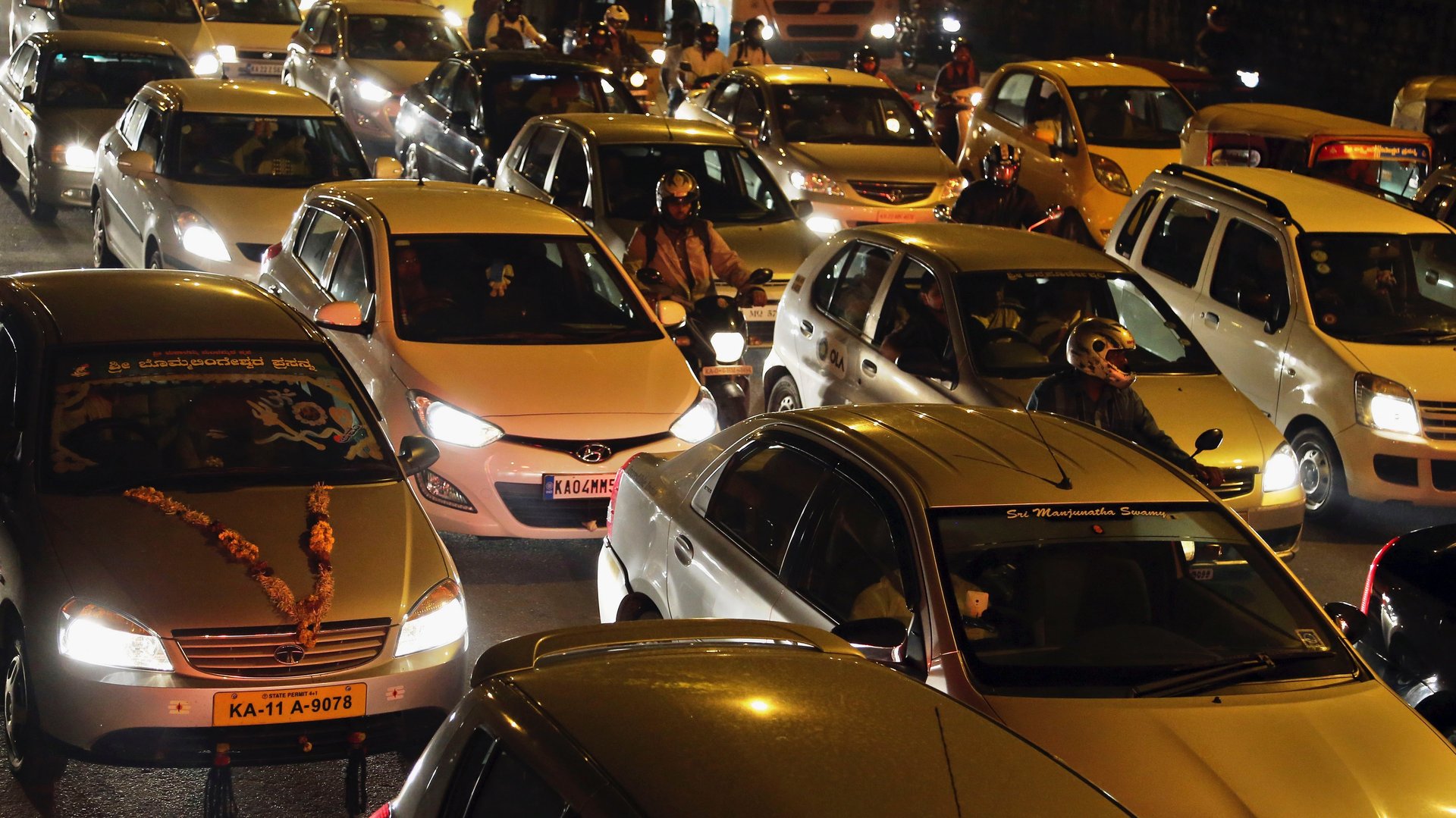An Indian state could use archaic laws to ban the best thing about Ola and Uber
As Uber and Ola strive to make ride-sharing a reality in more of India, a pushback from the Karnataka government could derail their plans.


As Uber and Ola strive to make ride-sharing a reality in more of India, a pushback from the Karnataka government could derail their plans.
The home state of Bengaluru, which, along with Mumbai and Delhi, is a major market for both competitors, has threatened to halt Uber Pool and Ola Share services. ”The transport commissioner said another meeting with drivers and representatives of Ola and Uber will be held on Monday, following which a decision on the fate of ride-sharing services will be taken,” the Mint newspaper has reported.
The discounted shared rides offered by Uber and Ola allegedly violate a law that bars multiple pickups during an ongoing trip, Karnataka’s state transport commissioner MK Aiyappa told representatives from Uber and Ola in a meeting on Jan. 25, the Mint report said.
“Ride sharing is not possible because they have contract carriage permit, which is for point-to-point drops and not picking up customers in between,” Aiyappa said. The contract carriage permits that are creating trouble for Uber and Ola’s carpooling services were also the reason bus aggregator Zipgo was pulled off Karnataka’s roads in December 2015. In the absence of concrete laws for bike taxis, officials also banned the commercial use of bikes by Ola and Uber under the same pretext.
Rolling back carpooling will likely hurt both companies who had only just begun to lap up its rewards. Chief executive Bhavish Aggarwal believes that Ola Share, which allows riders to travel with people from their own social groups instead of random strangers, is expected to account for most of Ola’s business by later this year. At the start of this year, more than 30% of the rides in Delhi and over 20% of the rides in Bengaluru were Uber Pool rides, the company said in a statement.
“We believe UberPOOL is clearly within the law. We will continue to engage with the transport department and Karnataka government as ridesharing products… are the future of urban mobility, helping decongest cities by getting more people into fewer cars and letting riders move around their city more affordably,” a spokesperson for the San Francisco-based Unicorn said in another statement. Ola is yet to respond to a request from Quartz for its view on the government’s move.
A step back for the environment
Uber Pool and Ola Share do more than just reduce a rider’s trip cost—they also help curb environmental damage.
Delhi’s apocalyptic pollution has eclipsed the hazards in the rest of the country, but the air quality in Bengaluru, a city known for its salubrious weather, too, has been far from ideal for years now. Rising vehicular population, account for 42% of the city’s alarming air pollution.
Since Uber Pool’s India launch nearly a year-and-a-half ago, it has saved over 1.5 million litres of fuel, thereby reducing carbon dioxide (CO2) emissions by 3.5 million kilograms, the company said in a press release. It arrived at these numbers by calculating the number of overlap miles in matched Uber Pool trips and comparing it to solo trips. Uber Pool spans five Indian cities.
Meanwhile, Ola, the country’s biggest ride-hailing service, which made its carpooling feature available in 15 cities, had even bigger savings in 2016: More than four million litres of fuel, effectively cutting back on 6.5 million kgs of CO2 emissions. Ola told Quartz that its drivers are trained to conduct regular emission checks to ensure that the car’s efficiency doesn’t deteriorate.
“There is an appetite for more options for reliable, efficient, and affordable ways to get to and from work, particularly around commuting routes underserved by public transit,” Uber told Quartz at the start of this year, touting a reduction in the number of vehicles on the roads and near-complete elimination of parking as tangible benefits of sharing rides with other commuters. “[It] has the potential to cut congestion—and therefore pollution.”
At legal loggerheads
The cab services have had to keep up with myriad demands from India’s central and state governments.
In August, capital Delhi disallowed surge pricing and added a maximum fare cap in the Delhi National Capital Region (NCR). Karnataka, Maharashtra, and West Bengal, too, enforced similar rules. Besides blocking surge pricing, some states mandated that vehicles run on unleaded petrol or compressed natural gas, drivers follow a dress code, and the cars a color code.
The companies haven’t had it smooth with drivers either. Earlier this month, cabbies in Hyderabad demonstrated against their remunerations taking a hit as aggregators signed on even more drivers. A few days ago, Uber and Ola drivers refused to ply in Bengaluru, protesting against poor pay and long work hours.